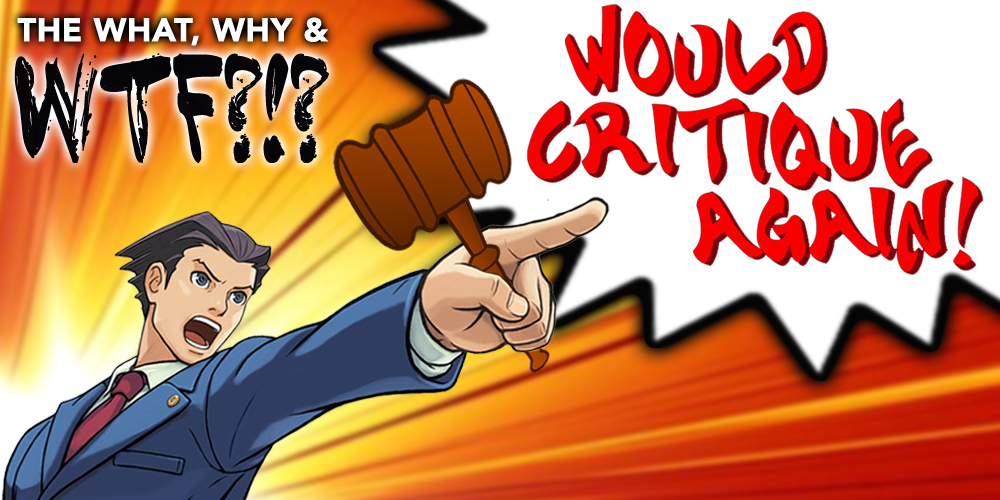
Editor’s Note: The What, Why, and WTF is a fortnightly article series that explores the culturally pervasive elements of gaming, those parts of video games that seem to have left some mark on gaming as a whole or Nick just finds really interesting. It is in no way an academic source, despite liking to pretend it is.
Gaming has changed. It’s not about kids or fun, it’s not even about satisfaction, content, or demographics. It’s an endless series of profit battles fought by corporations and marketing teams. Gaming, and its vast consumption of human time, has become a rational, well-oiled, business transaction. As gaming has changed, so too has its critics. Websites like Polygon and Gamespot are still valid resources to find the latest gaming news, but the lens through which we experience games (not to mention just about everything else in our lives) has been drastically altered as technology has become more commonplace.
As more and more avenues of exposure (and acquisition!) become available to the consumer, has the value of the video game review been compromised? I had a hard time justifying reviewing games to someone after they pulled out the ‘videogames are a transitive and highly subjective medium’ argument on me. As evidenced by the existence of this article, I think that his argument was as strong as a leprous orphan’s nervous system, but lil’ Wesley’s crippled eyesight still pertains to a very real point: What’s the point in critically reviewing something that relies heavily on player agency to create the intended experience? Same reason people watch Pewdiepie.
There are two sides to just about any critical analysis, including our own reviews, the most obvious one being the quantitative score. It’s fairly common practice to give a game or movie a score out of 10, regardless of how arbitrary the scoring system may be, because it’s really useful to have. We, as people, take shortcuts when assessing stuff, and PR firms, as businesses, need quick, reliable, and objective ways to analyse what people think of particular games. Numbers let us view an opinion at a glace and gain at least some insight into the quality of the game in question, and Metacritic is the pinnacle of this. The problem is that games are not easily (or accurately) summarised by a single number; they are complex amalgamations of animations, mechanics, decisions, storytelling, algorithms, bugs, and a whole bunch of stuff I don’t even know the names of. From all of this, players don’t tend to think of games as an ever-changing score in their head, they generate qualitative responses.

Look at that smug, blue grin. Despicable.
Arguably the most important part of any review, the qualitative side explains why the reviewer liked or disliked the game. The laborious amounts of text that everyone skips past to see what the game scored (I don’t blame you, reading sucks) not only elaborates the reviewer’s justification of the final score, it offers the chance for detailed opinion. “What?! Opinion!? But I yearn for objectivity in my reviews,” I hear you cry, unable to accept that all a review is is an opinion. Fun, gratification, and enjoyment are all generated from whoever is playing the game, not the game itself. Wanting objectivity in a review for something designed to elicit emotions is impossible to achieve without eliminating what explains the ‘objective’ score in the first place. But you’re right, opinions and emotions do cloud judgement. If only there was some way to experience the game before buying i- oh yeah. The internet.
Critique is no longer limited to the age old method of a random dude writing up some words and publicly displaying them in a magazine or website; nowadays we’ve got access to video reviews, let’s plays, demos, forums, and even webcomics that can help in creating discussion about a particular game’s strengths and shortcomings. All of these methods still expose you to the game via someone else’s experience or judgement, but they’re a lot less influenced by opinion and more two-way than conventional reviews. Let’s Plays and demos are especially useful since you can see a game in action, free of marketing hype, and decide for yourself whether you’d buy it or not. So, if we have this plethora of alternative means to inform ourselves on a game that don’t rely on someone else’s opinion, why do we (aka, you) bother with the ones that do?
Essentially, it all boils down to perspective; no one’s playthrough of a game will be exactly the same, but that’s not to say that our experiences will be entirely different. You might want to find all the shiny things or get all the achievements while someone else will just want to smash through the story and move on. You’ll be playing very differently, but the mechanics, graphics, and design of the game will be pretty consistent between you both. From each playthrough, each of you can form opinions about the underlying mechanics and how they all work together from different playstyles… But that doesn’t answer the question of why we bother with conventional reviews. Well, you care what other people think.

Above: Perspective in action.
You care about what we think, you care what the internet thinks, and god dammit you will murder that one guy who thinks that Killer7 was ‘a bit too samey’. In fact, you care so much about what other people think, you want to know what EVERYONE thinks. Approval from others buffs our self-esteem, even indirect approval, and knowing that the world has good taste can help restore that little bit of faith in humanity you never had. The more reviews that respond to a game the same way you did, the better you feel, and conventional written reviews are just another source for you to weigh in on (and sometimes they know it; just scroll down and look at that flip-flop scoring). And as the years pass you by like those wasted opportunities during the last Steam Sale, you begin growing accustomed to that source because they’re just… Right.
The personality of a critic is indistinguishable from the review, but which ones you respect the most are affected by you, the reader. Do you think Yahtzee gained his rep from being a monotone critic whose neutral stance on all games borders on psychopathic? Do you think IGN is constantly bagged because every review they write is meticulously compared to ensure that their scoring is universally valid? Hell to the naw, but people gravitate towards them because they offer them a viewpoint that they can get on board with in a format they enjoy. You might prefer Gamespot to Kotaku because their rationale or style seems better than the other; It’s not that one’s outright wrong, it’s just that the other is more right. Once you find that reliable source, you can confidently rely on that information, but critics are no longer solely in charge of dishing out the scores, and what makes you think we know anything to begin with?
User ratings aren’t exactly brand spanking new, but they’re certainly a lot more prominent than they were a decade ago. Metacritic, Steam, and GoG all integrate user ratings (or recommendations) into their site, which is kind of the greatest thing ever. Sure, a video game critic of 10+ years probably knows what he’s talking about, but I wanna hear what the avid gamer of 20+ years who is effectively an encyclopaedia on 4X strategy games thinks. By opening the floor to the public, we can see responses from literally every possible angle. Newcomers, long-time gamers, filthy casuals, they can leave their thoughts for whoever wishes to appreciate it. No longer are the critics the main source of critique, and I love it.

Oh, you read Polygon? You must be an academic.
The obvious drawback of this is when people criticise the opinions of others without warrant, because, you know, the internet. I’ve gotten a bit of hate for not knowing enough game design to properly critique video games, and as handy as that knowledge might be to eloquently describe my point, it’s not going to fundamentally cripple my review of a game. Just because someone doesn’t know the precise intricate workings of a car doesn’t mean they can’t say it was fun to drive. Perhaps because my opinion was published on a website as ‘a critic‘, I’ve implicitly accepted the risk of copping hate, but that opinion is still valid regardless of whether or not I’ve read every ludology textbook in existence (assuming the justification isn’t balls, then by all means, call me out). What I write in my reviews and what others write in theirs are perfectly acceptable responses to a subjective experience, regardless of whether you agree with it or not.
There is no ‘right’ review for any given game, humans and video games just don’t work that way, so why do we discount reviews that the majority/you disagree with? Well, we crave simplicity (despite it’s obvious pitfalls), and if there’s no clear cut general opinion of a game (thanks ‘objective’ scoring!), that complicates matters. Don’t get me wrong, simplicity is important, but not everything is as simple as arithmetic. Investigating controversial opinions gives us insight into aspects of games that were otherwise ignored, and we should be embracing those opinions as a valuable part of the critical landscape instead of rejecting them as ‘wrong’ or deviant. Outliers they may be, a variety of opinions is crucial to critique, and as more voices are heard, the more discussion is had, the better informed the consumer will be.

And the only opinion this game should garner is ‘Perfection.’
Critiquing video games will always be plagued with the issues of subjectivity and transitivity, but to reject their merit based on those issues doesn’t hold much weight. Reviews approach games from a perspective that isn’t your own, one that is just as valuable and informative as any other. I’m not saying that written reviews are beyond compare, but it’s still another addition to the critical landscape – one that allows for excessive usage of links! – to offer more information for the consumer. But that’s just, like my thoughts, man.











